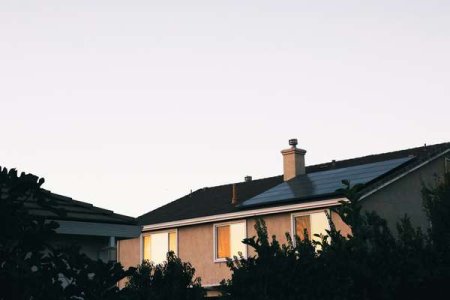Aussie couple slashes electricity bills to just $20 a quarter—here’s how YOU can do it
- Replies 12
In the land down under, where the sun shines aplenty, Australians are turning to the skies not just for a good dose of Vitamin D but also for a solution to their rising electricity bills.
An Aussie couple have become the face of energy efficiency and financial savvy, having slashed their electricity bill to a mere $20 a quarter.
This feat is even more impressive, considering they're using more energy than ever before.
Queensland residents Ben Holliday and his partner Myrella have saved $1,300 on their electricity bills since installing a solar battery system at their Brisbane home in May.
Holliday mentioned that they managed to qualify for the government’s rebate scheme just before it closed.
‘It’s a 13.5 kWh battery Tesla Powerwall 2, and it would have cost us $14,000, but we were able to utilise the Queensland Government’s battery booster scheme, so we got a $3,000 rebate on that,’ the 31-year-old shared.

Although the government’s cashback offer ended in May, battery provider VoltX is now offering Queensland households a $1,600 rebate on the upfront cost of installing a battery, similar to the offer for NSW residents.
Holliday, a mechanical designer and project manager, shared that the couple now has access to a surplus of free power and has actually increased their energy usage.
‘We still move all our loads to during the day to utilise the solar as much as possible so washing machines, hot water, all that kind of thing,’ he said.
‘We’ve also done some other energy efficiency upgrades to the house, like insulation and more modern air conditioner.’
‘So now we have the house set at 23C year round, and it’s not costing us anything really,’ Holliday added.
He mentioned that the savings were proving helpful as costs continued to rise. He also noted that their mortgage was the couple's biggest expense, especially with multiple interest rate hikes since they purchased their home.
‘Our mortgage is about $3,500 a month at the moment. So it’s far and away the biggest expense we’ve got,’ Holliday shared.
‘I think the only thing that would come close would be $500 of rates every quarter. That’s probably the next biggest one or insurance for the house or for the cars.’
There are various state-based incentives available for solar batteries.
In New South Wales, rebates range from $770 to $1,150 for a 6.5 kWh battery and from $1,600 to $2,400 for a 13.5 kWh battery.
The Northern Territory offers eligible homeowners and businesses a grant of $400 per kilowatt hour of usable battery capacity, up to $5,000.
Queensland previously provided rebates of up to $4,000 for home batteries, but this ended on May 8, 2024.
Victoria offers interest-free loans of up to $8,800 for households to install solar batteries, while the ACT provides zero-interest loans between $2,000 and $15,000 for energy-efficient products.
 Have any of you made the switch to solar energy, or are you considering it? What has your experience been with rebates and the installation process? Share your stories and tips in the comments below—your insights could light the way for others to save!
Have any of you made the switch to solar energy, or are you considering it? What has your experience been with rebates and the installation process? Share your stories and tips in the comments below—your insights could light the way for others to save!
An Aussie couple have become the face of energy efficiency and financial savvy, having slashed their electricity bill to a mere $20 a quarter.
This feat is even more impressive, considering they're using more energy than ever before.
Queensland residents Ben Holliday and his partner Myrella have saved $1,300 on their electricity bills since installing a solar battery system at their Brisbane home in May.
Holliday mentioned that they managed to qualify for the government’s rebate scheme just before it closed.
‘It’s a 13.5 kWh battery Tesla Powerwall 2, and it would have cost us $14,000, but we were able to utilise the Queensland Government’s battery booster scheme, so we got a $3,000 rebate on that,’ the 31-year-old shared.

A Queensland couple cut their electricity bill to $20 a quarter by installing solar panels and a Tesla Powerwall 2, using government rebates. Credit: Unsplash / Giorgio Trovato
Although the government’s cashback offer ended in May, battery provider VoltX is now offering Queensland households a $1,600 rebate on the upfront cost of installing a battery, similar to the offer for NSW residents.
Holliday, a mechanical designer and project manager, shared that the couple now has access to a surplus of free power and has actually increased their energy usage.
‘We still move all our loads to during the day to utilise the solar as much as possible so washing machines, hot water, all that kind of thing,’ he said.
‘We’ve also done some other energy efficiency upgrades to the house, like insulation and more modern air conditioner.’
‘So now we have the house set at 23C year round, and it’s not costing us anything really,’ Holliday added.
He mentioned that the savings were proving helpful as costs continued to rise. He also noted that their mortgage was the couple's biggest expense, especially with multiple interest rate hikes since they purchased their home.
‘Our mortgage is about $3,500 a month at the moment. So it’s far and away the biggest expense we’ve got,’ Holliday shared.
‘I think the only thing that would come close would be $500 of rates every quarter. That’s probably the next biggest one or insurance for the house or for the cars.’
There are various state-based incentives available for solar batteries.
In New South Wales, rebates range from $770 to $1,150 for a 6.5 kWh battery and from $1,600 to $2,400 for a 13.5 kWh battery.
The Northern Territory offers eligible homeowners and businesses a grant of $400 per kilowatt hour of usable battery capacity, up to $5,000.
Queensland previously provided rebates of up to $4,000 for home batteries, but this ended on May 8, 2024.
Victoria offers interest-free loans of up to $8,800 for households to install solar batteries, while the ACT provides zero-interest loans between $2,000 and $15,000 for energy-efficient products.
Key Takeaways
- A Queensland couple have dramatically reduced their electricity bill to $20 a quarter by installing solar panels and a Tesla Powerwall 2 battery system, capitalising on government rebates.
- Ben Holliday and Myrella took advantage of the Queensland Government's battery booster scheme, which gave them a $3,000 rebate towards the cost of their solar battery.
- Despite increasing their energy consumption, the couple's electricity costs have significantly decreased due to their solar investment and other energy efficiency improvements in their home.
- Various state-based solar battery rebates are available in Australia, with incentives ranging from partial rebates to grants, helping to offset the upfront costs of installing battery systems.







